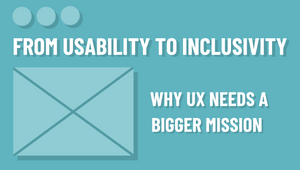
Sustainable Production: Aqsa Horne-Khan’s Guide to Green Events

Over the last 10 years, Aqsa Horne-Khan has led strategic marketing campaigns, worked in PR and crisis management, and has organised successful events across the fashion and lifestyle sectors. Highlights include organising London Fashion Week shows; contributing to Bestival and Wilderness; co-founding SO JUST SHOP and developing it into a profitable business; and launching her own brand, Marketing by Aqsa, to empower small business owners during the lockdown period. In 2021 she joined Momentum Worldwide in the UK as a production manager, where she lives by the motto: “It's not what brands say, it's what they do that matters.”
LBB’s Alex Reeves caught up with Aqsa to find out how her event and activation production takes sustainability into account.
LBB> Can you tell us about your own personal experiences when it comes to getting sustainable production - how did you get started and where has that journey taken you?
Aqsa> My background is in fashion, so I have seen the negative impact the industry has on the environment first-hand. When I started producing events, I made it my personal goal to be more efficient and sustainable, including reusing and repurposing sets from previous years, hiring rather than purchasing, and working closely with local suppliers and communities.
I love that Momentum’s motto is “It’s what brands DO that matters” because it focuses on taking action. It’s something that stood out to me when I joined them as a production manager. I wanted to produce events and experiences that align with my personal values — to create and produce memorable experiences that create a positive social and environmental impact.
LBB> What are the conversations that clients are having with you about their desire to reduce the carbon footprint and environmental impact of their content production?
Aqsa> Clients are starting to realise that they need to be more conscious of their environmental impact. As Momentum’s strategy develops, we will work with more of our clients to support education and requirements around their sustainability goals.
LBB> Speaking generally, how do you tend to approach assessing and minimising the footprint of the productions you are involved in – and is this something that is built into your processes?
Aqsa> Planning and thinking ahead is a large part of the process. I ensure that all parts of the event/activation are serving a purpose and carefully consider the lifecycle of the materials we plan to use. The key question to ask is: Are we building with the intention of reusing assets at future events or will it be disposed of afterwards? We’ll ensure that all of the materials we use can either be recycled, repurposed or donated, in case we have to dispose of them following the event. Where possible, we rent furniture and props or use things from storage that have been built for past events.
LBB> To what extent do you think the advertising and production world will retain and build on the lessons learned during the pandemic?
Aqsa> The pandemic has shown everyone the effectiveness of hybrid events. You can increase your reach and make your event more accessible by providing the option of joining online. Not only is it better for the planet, it provides greater flexibility for the delegates, too. I think it’s a no-brainer for conferences, award ceremonies and even smaller company-wide events.
LBB> What have you been finding are the most useful tools, resources and partners for reducing environmental impact/carbon footprint of productions?
Aqsa> Isla and the Make it Matter system that Momentum is building are key resources for reducing our environmental impact. Companies like Event Cycle make it easy to repurpose event assets by collecting them directly from the site and rehoming them where they are most needed (charities, schools, community spaces, etc.) for a tiny fee.
LBB> How is sustainability being built into your training and development for members of the production team?
Aqsa> We’re very lucky to have Selina Donald as our global director of sustainability. She has been working to get us ISO certified, as well as developing Make it Matter and training our production team on new processes and tools we can incorporate to ensure we are even more sustainable.
LBB> At a recent Ad Net Zero event, Mark Read at WPP said that in total just 3% of the footage shot ends up on screen. Does this signify huge wastage and the need for greater efficiencies in the production and craft or do you have other thoughts on this stat?
Aqsa> This stat is specifically talking about filming and ad production rather than events and activations. But, with tighter briefs and effective planning, you can work more efficiently. For event production and live experiences, we need to look at what is actually necessary to drive the message or experience and use that as a basis for our work. Everything beyond those key elements are decorative, which you can then assess for need/value/impact.
LBB> In some ways it seems that when it comes to reducing carbon footprint, the advertising and marketing industry is focused almost exclusively on production (for good reason - there are obvious areas in production where clear, substantial and measurable progress can be made). What are your thoughts on this?
Aqsa> Production is a great place to start because, as you said yourself, we can make substantial, measurable progress — which is super important! But, I also think it’s important to use PR/media as an educational tool to help spread the message far and wide. We need to make sustainable lifestyles and taking positive action towards climate change the norm for everyone. Sustainability should be intersectional and accessible to all.
LBB> Looking more broadly than carbon footprint, what are the other ways that production can be more sustainable?
Aqsa> Looking at the 17 globally recognised UN Sustainable Development Goals is a good place to start. They were designed to work as a blueprint for creating a more sustainable future for all. We can use the system as a checklist when planning and producing events to ensure that we can create a positive environmental and social impact.
LBB> To what extent is the social or community impact of a production an important part of the sustainability conversation?
Aqsa> I believe social impact is entwined with sustainability; they are very much part of the same conversation. The event’s success is partly dependent on community involvement and buy-in. Sourcing directly from local businesses and suppliers not only reduces carbon emissions but also gives back to the surrounding communities. By working with companies like Fat Macy’s — a social enterprise and event catering business that trains Londoners living in temporary accommodation as chefs and helps them move into their own homes — means that we’re giving back to create a better world, and meeting SDGs 1,4 and 8 in the process.
LBB> Can you share some examples of projects you’ve worked on where you feel that the carbon footprint and sustainability were tackled in interesting or effective ways?
Aqsa> Our stands for Microsoft and Unilever at COP26 were the most sustainable projects we’ve worked on to date. We spent weeks researching different materials options to ensure that every element of our stands were as sustainable as they could be. For example, we used locally sourced Marmoleum flooring, which is created from 97% natural raw materials including rosin, wood flour, linseed oil, jute and limestone, making it one of the most sustainable floor coverings available. The display tables were crafted from cardboard Re-board and the walls were made from FSC wood (which were later reused by Ideal Homes Show). This goes to show that with enough time and resources, we can work towards ensuring events, experiences and activations are truly sustainable.
LBB> What advice would you give to anyone working in production, whether for a production company, agency or brand, who is struggling to get buy-in from their clients and colleagues on sustainable production?
Aqsa> It’s the only way forward. Present them with the facts and research, and show them what’s possible.









